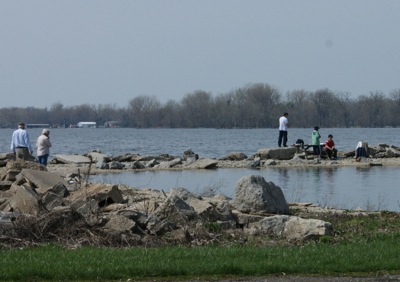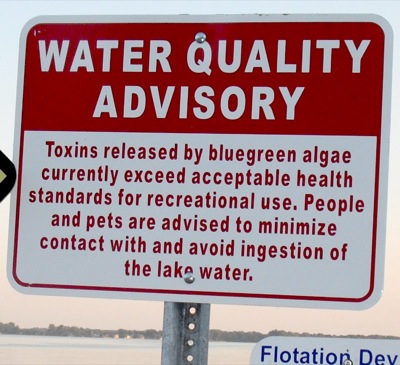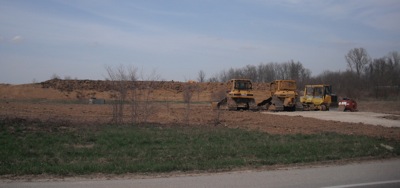Tuesday, April 6th, 2010
State lifts water warning
Grand Lake algae toxin levels fall below threshold for recreational safety
By Nancy Allen

Photo by Shelley Grieshop/The Daily Standard
Walkers and anglers take time to enjoy the spring weather on a pier along the East Bank of Grand Lake on Monday. The state on Monday lifted a water quality advisory placed on the lake last summer.
GRAND LAKE - A water quality advisory placed on Grand Lake last summer due to high algae toxin levels has been lifted and signs posted around the lake are coming down, at least for now.
The Ohio EPA, Department of Natural Resources and Department of Health announced Monday water quality sampling done in the lake shows levels of the previously-detected microcystin toxin have fallen below the World Health Organization's (WHO) guideline for concern. The WHO sets the recreational water exposure limit for the toxin at 20 parts per billion (ppb), a level considered a "moderate risk" to human health.
The levels have been below 20 since November, when water temperatures dropped. Samples taken in April show the level at 1.5 ppb.
In the summer of 2009, the levels in Grand Lake were consistently in the 40-60 ppb range with a high of 82 ppb. Science suggests warm weather and sunlight contribute to higher levels of microcystin. The WHO does not deem it a severe risk to human health until levels reach 2,000 parts per billion, Ohio EPA spokeswoman Dina Pierce said.
Kent Bryan, Celina community development and planning director, said the advisory being lifted is good news.
"That's great, but we've known since the second week in November (the toxin level) has been down," Bryan said. "Nobody knows when it will go back up, but we will continue to do the testing weekly and hope that the conditions are such that it doesn't go back above the WHO's level and, if it does, it's brief."
Lakeside business owners said last year they lost money and fewer boats were seen on the lake due to signs warning of the toxin. Many local officials seeking to promote tourism around the lake feel the water quality advisory has given the area a black eye.
Bill Goodwin, a boat salesman and owner of Kozy Kampground on the lake's south side, said last year's advisory was a farce. He called the officials in Columbus "out of touch" and "irresponsible" for declaring the warning in the first place.
"They scared everybody and there was nothing wrong with the water," he said, adding the EPA used an old study to make their determination. "They over-reacted. You can find something wrong with water anywhere if you look hard enough."
The fallout from the EPA announcement was devastating to the area, he said.
"There were hardly any boaters on the lake last year and they (EPA) helped close two marinas (East Bank and Ohio Marine). Two more are hanging by a thread," he said.
Goodwin said he normally sells 20 to 30 boats throughout the year but last year sold just seven. He estimates he and others lost up to two-thirds of their business.
He's happy about the cur-
rent efforts to improve overall lake water quality and hopes businesses and individuals step up to the plate to help finance the venture, he said.
Because recent water samples are below the toxin warning level, the recreational use of the water is safe; however, state agencies recommend lake users avoid ingesting untreated lake water. There is no ban on swimming, boating, fishing or other recreational activities on the lake.
As warmer weather arrives, it is possible that microcystin levels will rise above the WHO risk provisional guideline resulting in the advisory signs being re-posted.
Levels dropped during the winter months because cold weather kills much of the algae, said Todd Hone, assistant superintendent of the Celina Water Treatment Plant.
"The algae died off in September and October and when it decomposes it releases the toxins," Hone said. "When it got to December, the toxins were depleted."
Hone said conversely, it is likely the microcystin levels will go back up to levels requiring the advisory once the weather warms. Hone said he has seen the lake's massive algae bloom begin as early as April and as late as June.
"If the pattern that has been seen over the last couple of years continues, then it's likely, but there's no way to know for certain," Hone said.
On whether the advisory will remain lifted, Hone said, "We'll keep our fingers crossed."

Photo by Nancy Allen/The Daily Standard
Signs like this one were posted around Grand Lake starting last summer after a toxin-produced algae was found in the lake.


